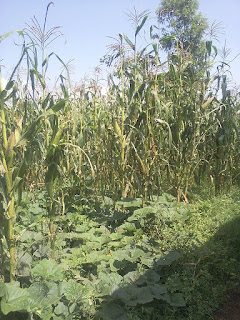In Food Crisis of Own Making
 Mr Mkulima is a farmer of renown this part of our village. He is a noted hardworking man no wonder praiseworthy names have been ascribed to him as titular honours. The one we've come to associate him with is that of Farmer Number One.
Mr Mkulima is a farmer of renown this part of our village. He is a noted hardworking man no wonder praiseworthy names have been ascribed to him as titular honours. The one we've come to associate him with is that of Farmer Number One.
Before each planting season, he sets the precedent that other farmers emulate. If, for example, he begins clearing his shamba the residues of the last harvest, farmers likewise follows suit. This is irrespective if the rains are a month or two away. When you hear the villagers say that Mr Mkulima can forecast rains with an accuracy that can baffle the local weatherman, you better take cue and prepare your land accordingly.
That Mr Mkulima is an indisputably hard worker is reinforced by the fact he rises early and can be seen most of the day tending to his crops. Despite the fact most of farmers here owns pieces of land less than an acre in acreage, Mr Mkulima beats them hands down when it comes to harvesting. The much each farmer would get are ten bags of shelled maize at most whereas the Farmer Number One gets an average of thirty bags. The problem, however, is that most farmers have refused to embrace new farming concepts opting to stick with the "tried and tested" methods, no wonder harvests are dismal each other season.
The problem for most farmers is disposing most of their little harvests at a go mainly to middlemen and subsisting on a bag or two that doesn't last them to the next harvest season. And here is where lies the irony of farmers in a food sufficient area buying most of their daily staple, mainly finely shifted maize flour, from the shops. Mr Mkulima has the luxury of feeding from his store as he can boast of surplus bags to see him to the next harvest season. This is after selling bulk maize bags to the National Cereal and Produce Board.
Mr Mkulima hates middlemen with a passion. He had attempted to educate his fellow farmers to form an association and market their produce through but none had bought into his idea. And so middlemen have been making a beeline in the village at commencement of harvesting season paying the farmers a pittance for their sweat.
Last season was a very unusual one for the Farmer Number One as he recorded a bumper harvest. Forty shelled bags from his 0.9 hectares was a record. He could dispose thirty bags to the NCPB and subsist on the remaining ten till this year's harvest season. He didn't have a large family anyway.
Unfortunately, he couldn't market his produce after the NCPB said their stores were full and were not buying maize from the farmers. As dispiriting as it sounded, Mr Mkulima held on hopes of selling his produce to institutions of learning. The sad part being many such institutions had contracted suppliers, the farmer was left with much produce in his hands. He decided to hoard his maize believing an opportune time would come when he would offload it to the market.
And such a time did come. The government through the Ministry of Agriculture claimed of a maize shortage in excess of million bags in its strategic grain reserve. Mr Mkulima and similar minded farmers thought this was the perfect time to sell their produce to the government. Then came the dumper; the government was waiving import duties to however would bring bulk maize into the country. The likes of Farmer Number One were overlooked as importers were favoured. Maize from Mexico, Uganda and Tanzania flooded the country while local farmers couldn't sell their produce to the government!
More likely, the politically connected were the main beneficiaries.
This season, however, is different for Mr Mkulima and other farmers. Rather than wait to harvest, the farmer set a new precedent that all others have followed. He sold his yet green maize as silage for a tidy sum. When other farmers learned there was good money to be made from green maize than dry shelled one, they followed suit. Lorries had been transversing the village roads and leaving with loaded green maize as well as the stalks.
According to Mr Mkulima, there's no way he's likely to recoup on his investment waiting to sell to the NCPB when cartels have taken over in sourcing and supplying maize to the strategic grain reserve. More, it was humiliating to hear from a fellow farmer of his how the latter went to Uganda, leased land and farmed maize and brought it to Kenya selling same for a killing to the government, which made Farmer Number One conclude it was better to buy rather than to farm maize in Kenya. And this is what informed his selling of green maize.
And with every farm denuded of maize crop, most farmers will have to dig deeper into their pockets or look for alternative food crops to subsist on. It doesn't warm the heart especially at a time a hike in fuel prices has pushed up the cost of living.



Comments
Post a Comment